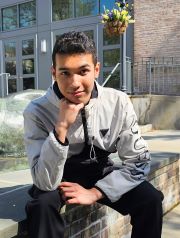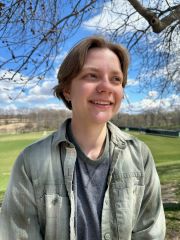Students Demonstrate Computer-Driven Solutions to Transportation Challenges at Summer Research Symposium

Last month at Portland State University (PSU), two students showcased their work on transportation topics in a Summer Research Symposium held by the Virtual Alternative Research Experience for Undergraduates (altREU) Site on Computational Modeling. The altREU program, led by PSU Engineering & Computer Science professor Christof Teuscher, is funded by the National Science Foundation (NSF) and offers undergraduates experience in designing, programming, and using computers to benefit society.
While students in the altREU program worked on subjects ranging from crime analysis to predicting stock market trends, two participants chose to focus their efforts on multimodal transportation. Linden Faye and Allie Hopper dedicated their time in the ten-week program to autonomous vehicles (AVs) and nonmotorized data, respectively. Learn more about their projects below, and join us in congratulating these two students on their excellent work!
Linden Faye, Hofstra University
"In my reading, I was fascinated by the complexity and challenges involving autonomous vehicles. Despite the enthusiasm of embracing new technology, there is fierce discussion over autonomous vehicles among policymakers. City planners need a simulation tool to anticipate and proactively manage the effects of AVs. This has inspired me to develop an agent-based modeling (ABM) approach that simulated the behaviors of individual agents (workers, employers, etc.) to assess potential impacts of AVs on urban areas like Portland."
Linden's project focused on the effects of AVs on transportation networks. Using statistical analysis, geographic information systems, and data visualization, he developed and applied a strategic planning model of transportation using Portland as a case study. His research paper has been accepted by the NARSC 2024 committee, and he is going to present this ongoing project at the 71st Annual North American Meetings of the Regional Science Association International, Nov 13-16, 2024 in New Orleans. Watch the recording of his presentation for more details.
Allie Hopper, Carleton College
"I was interested in the program after reading about it on the official NSF site, particularly because of the focus on using computing to help the community. I've never worked in transportation before, so it was a great opportunity for me to learn more about all the hard work that goes into making everything work in Portland! Overall I'm grateful to have had this experience, and can only hope that some of the work can help reduce some of the resource burden of non-motorized counts and help improve safety, infrastructure, and planning."
Alllie's project focused on bicycles and pedestrian count data at intersections. Using Python and over forty thousand images from a EuroCity Persons Dataset, she trained a computer model to predict nonmotorized counts with a high degree of accuracy. Watch the recording of her presentation to learn more. She also presented her work to a group of transportation data professionals in a recent meeting of the PORTAL Users Group (PUG), September 5.
Portland State University's Transportation Research and Education Center (TREC) is home to the U.S. DOT funded National Institute for Transportation and Communities (NITC), the Initiative for Bicycle and Pedestrian Innovation (IBPI), PORTAL, BikePed Portal and other transportation grants and programs. We produce impactful research and tools for transportation decision makers, expand the diversity and capacity of the workforce, and engage students and professionals through education and participation in research. To get updates about what's going on at TREC, sign up for our monthly newsletter or follow us at the links below.
Facebook | Instagram | LinkedIn | TikTok | Threads | X | YouTube


